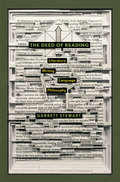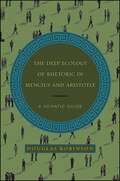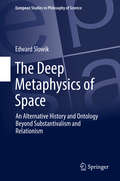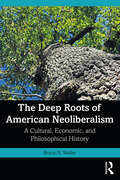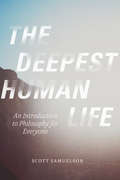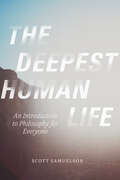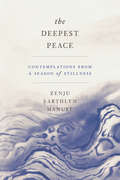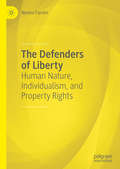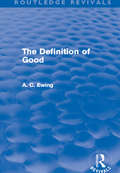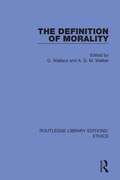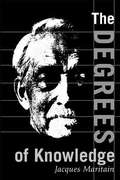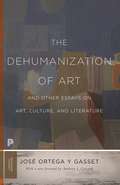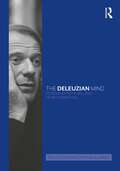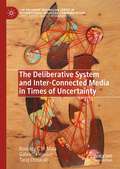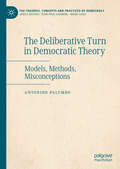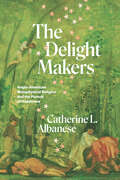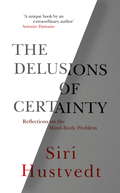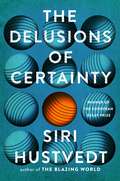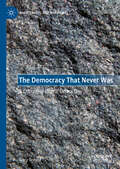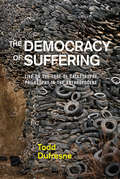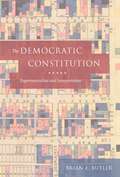- Table View
- List View
The Deed of Reading: Literature * Writing * Language * Philosophy
by Garrett StewartGarrett Stewart begins The Deed of Reading with a memory of his first hesitant confrontation, as a teenager, with poetic density. In that early verbal challenge he finds one driving force of literature: to make language young again in its surprise, coming alive in each new event of reading. But what exactly happens in the textual encounter to make literary phrasing resonate so deeply with readers?To take the measure of literary writing, The Deed of Reading convenes diverse philosophic commentary on the linguistics of literature, with stress on the complementary work of Stanley Cavell and Giorgio Agamben. Sympathetic to recent ventures in form-attentive analysis but resisting an emphasis on so-called surface reading, Stewart explores not some new formalism but the internal pressures of language in formation, registering the verbal infrastructure of literary prose as well as verse. In this mode of "contextual" reading, the context is language itself. Literary phrasing, tapping the speech act's own generative pulse, emerges as a latent philosophy of language in its own right, whereby human subjects, finding no secure place to situate themselves within language, settle for its taking place in, through, and between them.Stewart watches and hears this dynamics of wording played out in dozens of poems and novels over two centuries of English literary production--from Wordsworth and Shelley to Browning and Hopkins, from Poe and Dickens through George Eliot, Conrad, James, and on to Toni Morrison. The Deed of Reading offers a revisionary contribution to the ethic of verbal attention in the grip of "deep reading."
The Deep Ecology of Rhetoric in Mencius and Aristotle: A Somatic Guide (SUNY series in Chinese Philosophy and Culture)
by Douglas RobinsonMencius (385–303/302 BCE) and Aristotle (384–322 BCE) were contemporaries, but are often understood to represent opposite ends of the philosophical spectrum. Mencius is associated with the ecological, emergent, flowing, and connected; Artistotle with the rational, static, abstract, and binary. Douglas Robinson argues that in their conceptions of rhetoric, at least, Mencius and Aristotle are much more similar than different: both are powerfully socio-ecological, espousing and exploring collectivist thinking about the circulation of energy and social value through groups. The agent performing the actions of pistis, "persuading-and-being-persuaded," in Aristotle and zhi, "governing-and-being-governed," in Mencius is, Robinson demonstrates, not so much the rhetor as an individual as it is the whole group. Robinson tracks this collectivistic thinking through a series of comparative considerations using a theory that draws impetus from Arne Naess's "ecosophical" deep ecology and from work on rhetoric powered by affective ecologies, but with details of the theory drawn equally from Mencius and Aristotle.
The Deep Metaphysics of Space
by Edward SlowikThis volume explores the inadequacies of the two standard conceptions of space or spacetime, substantivalism and relationism, and in the process, proposes a new historical interpretation of these physical theories. This book also examines and develops alternative ontological conceptions of space, and explores additional historical elements of seventeenth century theories and other metaphysical themes. The author first discusses the two main opposing theories of the ontology of space. One, known as substantivalism, proposes space to be an entity that can exist independently of material things. The other, relationism, contends that space is a relation among material things. Readers will learn about specific problems with this dichotomy. First, Newton and Leibniz are often upheld as the retrospective forerunners of substantivalism and relationism. But, their work often contradicts the central tenets of these views. Second, these theories have proven problematic when transferred to a modern setting, especially with regards to general relativity and the recent quantum gravity hypotheses. The author details an alternative set of concepts that address these problems. The author also develops a new classificational system that provides a more accurate taxonomy for the elements of all spatial ontologies. This classification obtains successful analogies between Newton, Leibniz, and other natural philosophers with contemporary physical theories.
The Deep Roots of American Neoliberalism: A Cultural, Economic, and Philosophical History
by Bruce N. WallerFocusing on why neoliberalism gained such a unique strong hold in the United States, philosopher Bruce N. Waller in this book traces the source back to the country’s origins and the entwined core values of the nation’s Founding Fathers. Their extreme commitment to private property rights (as evinced in a unanimous vote for the Constitution’s Fugitive Slave Clause), an aversion to widespread democracy, and a deep belief in the uniquely just nature of their new country together created the ideal conditions for neoliberalism’s growth and success. Waller also provides a clear analysis of the moral and psychological conditions so hospitable to neoliberalism, including the compatibility of a faith in the "invisible hand" of the free market with the widespread belief – which remains prevalent in the United States – that the world is just and people generally get what they deserve. Waller examines how the ideal of moral responsibility in the United States provides the core belief that holds in place the basic principles of American neoliberalism. The book ends by shedding light on the deleterious effects of neoliberalism and shows that its replacement requires not only the amelioration of enormous inequity in wealth, but also the opportunity for all citizens to exercise autonomy, control, and critical thought in their lives and workplaces. Key Features Traces neoliberal values deep into American history and culture Uses empirical psychological research to explain the broad appeal of neoliberalism Describes the strong interconnected neoliberal value system of belief in a just world, personal responsibility, and radical individualism, and their combined influence on American culture Examines the influence of neoliberal values on the American criminal justice and educational systems
The Deepest Human Life: An Introduction to Philosophy for Everyone
by Scott SamuelsonWinner of the 2015 Hiett Prize in the Humanities. Sometimes it seems like you need a PhD just to open a book of philosophy. We leave philosophical matters to the philosophers in the same way that we leave science to scientists. Scott Samuelson thinks this is tragic, for our lives as well as for philosophy. In The Deepest Human Life he takes philosophy back from the specialists and restores it to its proper place at the center of our humanity, rediscovering it as our most profound effort toward understanding, as a way of life that anyone can live. Exploring the works of some of history's most important thinkers in the context of the everyday struggles of his students, he guides us through the most vexing quandaries of our existence--and shows just how enriching the examined life can be. Samuelson begins at the beginning: with Socrates, working his most famous assertion--that wisdom is knowing that one knows nothing--into a method, a way of approaching our greatest mysteries. From there he springboards into a rich history of philosophy and the ways its journey is encoded in our own quests for meaning. He ruminates on Epicurus against the sonic backdrop of crickets and restaurant goers in Iowa City. He follows the Stoics into the cell where James Stockdale spent seven years as a prisoner of war. He spins with al-Ghazali first in doubt, then in the ecstasy of the divine. And he gets the philosophy education of his life when one of his students, who authorized a risky surgery for her son that inadvertently led to his death, asks with tears in her eyes if Kant was right, if it really is the motive that matters and not the consequences. Through heartbreaking stories, humanizing biographies, accessible theory, and evocative interludes like "On Wine and Bicycles" or "On Zombies and Superheroes ," he invests philosophy with the personal and vice versa. The result is a book that is at once a primer and a reassurance--that the most important questions endure, coming to life in each of us.
The Deepest Human Life: An Introduction to Philosophy for Everyone
by Scott SamuelsonThis accessible and thought-provoking introduction to philosophy shows how the eternal questions can shed light on our lives and struggles.These days, we generally leave philosophical matters to professional philosophers. Scott Samuelson thinks this is tragic, for our lives as well as for philosophy. In The Deepest Human Life, he restores philosophy to its proper place at the center of our humanity, rediscovering it as our most profound effort toward understanding, as a way of life that anyone can live. Exploring the works of some of history’s most important thinkers in the context of the everyday struggles of his students, Samuelson guides readers through the most vexing quandaries of existence—and shows just how enriching the examined life can be. Samuelson begins at the beginning: with Socrates, and the method he developed for approaching our greatest mysteries. From there he embarks on a journey through the history of philosophy, demonstrating how it is encoded in our own personal quests for meaning. Through heartbreaking stories, humanizing biographies, accessible theory, and evocative interludes like “On Wine and Bicycles” or “On Zombies and Superheroes,” Samuelson invests philosophy with the personal and vice versa. The result is a book that is at once a primer and a reassurance—that the most important questions endure, coming to life in each of us. Winner of the 2015 Hiett Prize in the Humanities
The Deepest Peace: Contemplations from a Season of Stillness
by Zenju Earthlyn ManuelA beautiful glimpse into the daily practice of a modern contemplative, The Deepest Peace reveals moments of stunning clarity from the eyes of a Zen priest. Through silence, stillness, and practice, Zenju Earthlyn Manuel transmits how it is possible to cultivate and experience peace.While there is suffering in the world and in each of us, there is also the possibility and the experience of peace. As Zenju Earthlyn Manuel, a Zen priest who has written at length on race, gender, sexual orientation, and homelessness, writes in the introduction: "I have testified many times of my suffering. Before I die, I must speak of peace." The Deepest Peace is a poetic, lyrical ode to the ways contemplative practice illuminates daily life. It is at once a window into Zenju's personal practice, and an invitation to begin our own.
The Defenders of Liberty: Human Nature, Individualism, and Property Rights
by Neema ParviniThe Defenders of Liberty presents a history of economic liberalism from the Renaissance to the present. It chronicles the tradition of thought that sees human nature as social yet self-interested, methodological individualism as its key analytical tool, and property rights as foundational to a civilised society. In the development of this way of thinking, it considers the contributions of many key thinkers including Niccolò Machiavelli, Thomas Hobbes, John Locke, Richard Cantillon, A.J.R. Turgot, David Hume, Adam Smith, Nassau William Senior, Richard Cobden, Herbert Spencer, Jean-Baptiste Say, Carl Menger, William Stanley Jevons, Gaetano Mosca, Eugen Böhm-Bawerk, Vilfredo Pareto, Phillip Wicksteed, Edwin Cannan, Ludwig von Mises, Lionel Robbins, F.A. Hayek, W.H. Hutt, Milton Friedman, George Stigler, Murray N. Rothbard, James M. Buchanan, and Thomas Sowell. The book contends that liberalism needs to be grounded in realism, and that it has been derailed whenever economists have deviated from an explicitly realist understanding of human nature, individualism and property rights. It argues that the cause of liberalism was compromised by errors in economic reasoning by such major figures as David Ricardo, John Stuart Mill, Alfred Marshall, A.C. Pigou, and John Maynard Keynes. In diagnosing what has gone wrong for liberalism in the twenty-first century, The Defenders of Liberty argues against substituting mathematical abstraction for causal realism; it opposes interventionist central banking; it seeks to recover economic liberalism from social and political liberalism, which are somewhat unrelated schools of thought; it resists a view of human nature rooted in selfishness or atomised individualism; and finally alerts defenders of freedom to the ruthless but effective language games played by their opponents. This book will be of interest to the educated general reader as well as undergraduates and postgraduates in disciplines such as economics, political theory and philosophy.
The Definition of Good (Routledge Revivals)
by Alfred C EwingFirst published in Great Britain in 1948, this book examines the definition of goodness as being distinct from the question of What things are good? Although less immediately and obviously practical, Dr. Ewing argues that the former question is more fundamental since it raises the issue of whether ethics is explicable wholly in terms of something else, for example, human psychology. Ewing states in his preface that the definition of goodness needs to be confirmed before one decides on the place value is to occupy in our conception of reality or on the ultimate characteristics which make one action right and another wrong. This book discusses these issues.
The Definition of Morality
by G. Wallace A. D. M. WalkerOriginally published in 1970, the papers in this volume discuss the essential and defining characteristics of morality and moral issues and examine how moral views differ from political views, moral beliefs from religious beliefs, and moral judgements from aesthetic judgements. Some of the chapters discuss problems of method and shed light on the complex conditions which any successful definition of morality must satisfy. Taken collectively, these papers reflect he wide variety of approaches adopted by contemporary philosophers.
The Degradation of Ethics Through the Holocaust
by Paul E. WilsonThis book discusses ethical behavior through the genocidal stages of the Holocaust. Paul E. Wilson first looks at the antisemitism in Germany and Europe beginning in the decades preceding the Nazis reign of terror, and goes on to discuss the ethical decisions made in the initial stages that moved society toward genocide. The author maintains that the stages of genocide represent subtle changes that can be happening within a society in response to the moral choices made by actors. By giving attention to the stages of genocide in the Holocaust, this book contributes to the overall understanding of how the Holocaust was possible, and encourages the moral community to join the watch for the development of genocide in the modern world.
The Degrees Of Knowledge (Collected Works of Jacques Maritain Volume #7)
by Ralph Mcinerny Jacques Maritain Gerald B. PhelanThis work is Maritain's masterpiece. Published as Distinguer pour unir, ou Les degres du savoir in 1932, the book proposes a hierarchy of forms of knowledge that culminates in mystical experience and that wisdom which is a gift of the Holy Ghost. His inspiration is St Thomas Aquinas.
The Dehumanization of Art and Other Essays on Art, Culture, and Literature
by José Ortega y GassetA classic work on radical aesthetics by one of the great philosophers of the early twentieth century No work of philosopher and essayist José Ortega y Gasset has been more frequently cited, admired, or criticized than his response to modernism, “The Dehumanization of Art.” The essay, originally published in Spanish in 1925, grappled with the newness of nonrepresentational art and sought to make it more understandable to the public. Many embraced the essay as a manifesto extolling the virtues of vanguard artists and promoting efforts to abandon the realism and the romanticism of the nineteenth century. Others took it as a denunciation of everything that was radical about the avant-garde. This Princeton Classics edition makes this essential work, along with four of Ortega’s other critical essays, available in English. A new foreword by Anthony J. Cascardi considers how Ortega’s philosophy remains relevant and significant in the twenty-first century.
The Deleuzian Mind (Routledge Philosophical Minds)
by Henry Somers-Hall Jeffrey A. BellGilles Deleuze was one of the most influential philosophers of the second half of the twentieth century. As with other French philosophers of his generation, such as Jacques Derrida and Michel Foucault, Deleuze’s work and his collaboration with Félix Guattari has also had huge influence in other disciplines, particularly literature, film studies, architecture, and science and mathematics.The Deleuzian Mind is an outstanding collection that explores the full extent and significance of Deleuze's work, its reception and its legacy. Comprising 38 chapters written by an international and interdisciplinary team of contributors, the volume is divided into eight clear parts: Situating Deleuze A New History of Philosophy. Deleuze’s Precursors Encounters Critical and Clinical The Early Philosophy. A Logic of Sense The Later Philosophy. The Wasp and the Orchid Art and Literature Deleuze, Maths and Science Deleuze and Politics. With its wide-ranging exploration of Deleuze’s thought and the huge influence it continues to have within the theoretical humanities and social sciences, The Deleuzian Mind is invaluable reading for students, researchers and scholars in philosophy, literature, film studies and political theory.
The Deliberative System and Inter-Connected Media in Times of Uncertainty (The Palgrave Macmillan Series in International Political Communication)
by Rousiley C. Maia Gabriella Hauber Tariq ChoucairAdopting a systemic perspective, this book explores media-based communication and reason-giving as a linkage process that transcends time and space. Arguments, reasoning perspectives and emotional concerns link elites’ and citizens’ political judgement within and across a set of interrelated arenas in the political system.
The Deliberative Turn in Democratic Theory: Models, Methods, Misconceptions (The Theories, Concepts and Practices of Democracy)
by Antonino PalumboThirty years of developments in deliberative democracy (DD) have consolidated this subfield of democratic theory. The acquired disciplinary prestige has made theorist and practitioners very confident about the ability of DD to address the legitimacy crisis experienced by liberal democracies at present at both theoretical and practical levels. The book advance a critical analysis of these developments that casts doubts on those certainties -- current theoretical debates are reproposing old methodological divisions, and are afraid to move beyond the minimalist model of democracy advocated by liberal thinkers; democratic experimentation at the micro-level seems to have no impact at the macro-level, and remain sets of isolated experiences. The book indicates that those defects are mainly due to the liberal minimalist frame of reference within which reflection in democratic theory and practice takes place. Consequently, it suggests to move beyond liberal understandings of democracy as a game in need of external rules, and adopt instead a vision of democracy as a self-correcting metagame.
The Delight Makers: Anglo-American Metaphysical Religion and the Pursuit of Happiness
by Catherine L. AlbaneseAn ambitious history of desire in Anglo-American religion across three centuries. The pursuit of happiness weaves disparate strands of Anglo-American religious history together. In The Delight Makers, Catherine L. Albanese unravels a theology of desire tying Jonathan Edwards to Ralph Waldo Emerson to the religiously unaffiliated today. As others emphasize redemptive suffering, this tradition stresses the “metaphysical” connection between natural beauty and spiritual fulfillment. In the earth’s abundance, these thinkers see an expansive God intent on fulfilling human desire through prosperity, health, and sexual freedom. Through careful readings of Cotton Mather, Andrew Jackson Davis, William James, Esther Hicks, and more, Albanese reveals how a theology of delight evolved alongside political overtures to natural law and individual liberty in the United States.
The Delight Makers: Anglo-American Metaphysical Religion and the Pursuit of Happiness
by Catherine L. AlbaneseAn ambitious history of desire in Anglo-American religion across three centuries. The pursuit of happiness weaves disparate strands of Anglo-American religious history together. In The Delight Makers, Catherine L. Albanese unravels a theology of desire tying Jonathan Edwards to Ralph Waldo Emerson to the religiously unaffiliated today. As others emphasize redemptive suffering, this tradition stresses the “metaphysical” connection between natural beauty and spiritual fulfillment. In the earth’s abundance, these thinkers see an expansive God intent on fulfilling human desire through prosperity, health, and sexual freedom. Through careful readings of Cotton Mather, Andrew Jackson Davis, William James, Esther Hicks, and more, Albanese reveals how a theology of delight evolved alongside political overtures to natural law and individual liberty in the United States.
The Delight Makers: Anglo-American Metaphysical Religion and the Pursuit of Happiness
by Catherine L. AlbaneseAn ambitious history of desire in Anglo-American religion across three centuries. The pursuit of happiness weaves disparate strands of Anglo-American religious history together. In The Delight Makers, Catherine L. Albanese unravels a theology of desire tying Jonathan Edwards to Ralph Waldo Emerson to the religiously unaffiliated today. As others emphasize redemptive suffering, this tradition stresses the “metaphysical” connection between natural beauty and spiritual fulfillment. In the earth’s abundance, these thinkers see an expansive God intent on fulfilling human desire through prosperity, health, and sexual freedom. Through careful readings of Cotton Mather, Andrew Jackson Davis, William James, Esther Hicks, and more, Albanese reveals how a theology of delight evolved alongside political overtures to natural law and individual liberty in the United States.
The Delusions of Certainty
by Siri HustvedtPrizewinning novelist, feminist, and scholar Siri Hustvedt turns her brilliant and critical eye toward the metaphysical issues of neuropsychology in this lauded, standalone volume. Originally published in her collection A Woman Looking at Men Looking at Women, The Delusions of Certainty exposes how the age-old, unresolved mind-body problem has shaped - and often distorted and confused - contemporary thought in neuroscience, psychiatry, genetics, artificial intelligence, and evolutionary psychology.
The Delusions of Certainty
by Siri Hustvedt&“The Delusions of Certainty is a unique book by an extraordinary author. Siri Hustvedt is a notable novelist, art scholar, and a philosopher of science. In this memorable and immensely enjoyable volume, Hustvedt rises above the exhausted debate over the two cultures, to demonstrate not just the possibility but also the advantages of combining the approaches of the arts, humanities, and sciences to illuminate a key aspect of the human condition: the mind-body problem.&” —Antonio Damasio, bestselling author of Descartes&’ Error and Self Comes to Mind &“Siri Hustvedt proves her membership in the highest rank of neuroscientists and philosophers who probe the nature of thought and the workings of consciousness. A novelist and a student of psychoanalysis and neuroscience, Hustvedt can ask questions others cannot ask about imagination, identity, epistemology, gendered power, and mortality. Her authoritative knowledge and her courage to challenge the status quo guide the reader to fresh epiphanies about what counts as human nature. The work is, in the end, a work of freedom.&” —Rita Charon, Columbia University &“The Delusions of Certainty is the best book on the mind-body problem I have ever read. Perhaps only a great novelist and essayist can address what neuroscientists and philosophers fail to question. Siri Hustvedt takes the reader on an inspiring journey into highly relevant and often unanswered questions about what it means to be human.&” —Vittorio Gallese, University of Parma Prizewinning novelist, feminist, and scholar Siri Hustvedt turns her brilliant and critical eye toward the metaphysical issues of neuropsychology in this lauded, standalone volume. Originally published in her &“canonical&” (Publishers Weekly) and &“absorbing&” (Kirkus Reviews) collection A Woman Looking at Men Looking at Women, The Delusions of Certainty exposes how the age-old, unresolved mind-body problem has shaped—and often distorted and confused—contemporary thought in neuroscience, psychiatry, genetics, artificial intelligence, and evolutionary psychology.
The Democracy That Never Was: A Critique of Liberal Democracy (Marx, Engels, and Marxisms)
by Gary TeepleLiberal democracy is usually treated as an independent variable, as possessing the absolutes of democratic rule. Its variable forms, changing principles and practice, and conscious destruction by its own advocates, in particular the United States, however, suggest that it is not what it appears to be. This book argues that it is a dependent variable, the political form required by the changing configurations of national capital and their countervailing forces. The forms of liberal democracy have always shifted in concert with the mode of production as their premise. The absolutes of liberal democracy, the author contends, have never been anything but the abstracted principles of the marketplace. Their nature has now become especially visible for what they have been because the premise as national capital development has changed, leaving liberal democracy as a form without its original content, and its present content out of keeping with a national jurisdiction. As a political form, it persists, but its role has been transformed from the regulation of national capital accumulation to the enforcer of the demands of global configurations of capital. It is a role that its citizens implicitly understand, as revealed in widespread political cynicism, decreasing electoral participation, and declining legitimacy that require ever greater measures of deceit from political leaders and increased means of coercive social control, including militarized police forces and pervasive electronic surveillance. There can be no going back to the stage of national politics because the neoliberal content of liberal democratic policies represents the necessities of global capital. And it is the contradictions of global capital that define the character of early 21st century political conflict.
The Democracy of Suffering: Life on the Edge of Catastrophe, Philosophy in the Anthropocene
by Todd DufresneIn The Democracy of Suffering philosopher Todd Dufresne provides a strikingly original exploration of the past, present, and future of this epoch, the Anthropocene, demonstrating how the twin crises of reason and capital have dramatically remade the essential conditions for life itself. Images, cartoons, artworks, and quotes pulled from literary and popular culture supplement this engaging and unorthodox look into where we stand amidst the ravages of climate change and capitalist economics. With humour, passion, and erudition, Dufresne diagnoses a frightening new reality and proposes a way forward, arguing that our serial experiences of catastrophic climate change herald an intellectual and moral awakening – one that lays the groundwork, albeit at the last possible moment, for a future beyond individualism, hate, and greed. That future is unapologetically collective. It begins with a shift in human consciousness, with philosophy in its broadest sense, and extends to a reengagement with our greatest ideals of economic, social, and political justice for all. But this collective future, Dufresne argues, is either now or never. Uncovering how we got into this mess and how, if at all, we get out of it, The Democracy of Suffering is a flicker of light, or perhaps a scream, in the face of human extinction and the end of civilization.
The Democracy of Suffering: Life on the Edge of Catastrophe, Philosophy in the Anthropocene
by Todd DufresneIn The Democracy of Suffering philosopher Todd Dufresne provides a strikingly original exploration of the past, present, and future of this epoch, the Anthropocene, demonstrating how the twin crises of reason and capital have dramatically remade the essential conditions for life itself. Images, cartoons, artworks, and quotes pulled from literary and popular culture supplement this engaging and unorthodox look into where we stand amidst the ravages of climate change and capitalist economics. With humour, passion, and erudition, Dufresne diagnoses a frightening new reality and proposes a way forward, arguing that our serial experiences of catastrophic climate change herald an intellectual and moral awakening - one that lays the groundwork, albeit at the last possible moment, for a future beyond individualism, hate, and greed. That future is unapologetically collective. It begins with a shift in human consciousness, with philosophy in its broadest sense, and extends to a reengagement with our greatest ideals of economic, social, and political justice for all. But this collective future, Dufresne argues, is either now or never. Uncovering how we got into this mess and how, if at all, we get out of it, The Democracy of Suffering is a flicker of light, or perhaps a scream, in the face of human extinction and the end of civilization.
The Democratic Constitution: Experimentalism and Interpretation
by Brian E. ButlerThe Supreme Court is seen today as the ultimate arbiter of the Constitution. Once the Court has spoken, it is the duty of the citizens and their elected officials to abide by its decisions. But the conception of the Supreme Court as the final interpreter of constitutional law took hold only relatively recently. Drawing on the pragmatic ideals characterized by Charles Sanders Peirce, John Dewey, Charles Sabel, and Richard Posner. Brian E. Butler shows how this conception is inherently problematic for a healthy democracy. Butler offers an alternative democratic conception of constitutional law, “democratic experimentalism,” and applies it in a thorough reconstruction of Supreme Court cases across the centuries, such as Brown v. Board of Education, Citizens United v. Federal Election Commission, Lucas v. South Carolina Coastal Council, and Lochner v. New York. In contrast to the traditional tools and conceptions of legal analysis that see the law as a formally unique and separate type of practice, democratic experimentalism combines democratic aims and experimental practice. Butler also suggests other directions jurisprudential roles could take: for example, adjudication could be performed by primary stakeholders with better information. Ultimately, Butler argues persuasively for a move away from the current absolute centrality of courts toward a system of justice that emphasizes local rule and democratic choice.
